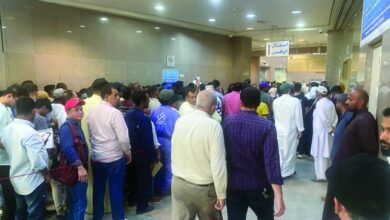Poor sleep triggers inflammation, boosting risk of chronic diseases
New research by Dr. Fatema Al-Rashed, a scientist at the Dasman Diabetes Institute, explores the impact of sleep quality on the immune system and its potential link to diseases like obesity, diabetes, and cardiovascular conditions.

• Dr. Fatema Al-Rashed, a scientist at the Dasman Diabetes Institute, highlighted that technology, screen time, and changing societal norms disrupt sleep patterns, impacting immune health and well-being.
New research by Dr. Fatema Al-Rashed, a scientist at the Dasman Diabetes Institute, founded by the Kuwait Foundation for the Advancement of Sciences, explores the impact of sleep quality on the immune system and its potential link to diseases like obesity, diabetes, and cardiovascular conditions.
The study, published in The Journal of Immunology, revealed that just one night of 24-hour sleep deprivation in young, healthy individuals altered immune cell profiles, making them resemble those of obese individuals, a condition linked to chronic inflammation. This suggests that the immune system is highly responsive to sleep, with rapid adaptation to changes in sleep patterns.
The researchers warned that if these changes persist, they could contribute to long-term inflammation and increase disease risk.
While sleep disturbances are already linked to chronic conditions like type 2 diabetes and cardiovascular diseases, the direct impact of sleep on immune cells, such as monocytes, remains less understood.
The researchers from the Dasman Diabetes Institute analyzed the sleep patterns of 237 healthy adult participants with varying BMIs and took blood samples to profile the levels of different monocytes and inflammation markers. They found that obese individuals had significantly lower sleep quality and higher chronic low-grade inflammation compared to the lean group.
Dr. Fatema Al-Rashed, who led the study, said, “Our findings highlight a growing public health challenge. Advancements in technology, prolonged screen time, and shifting societal norms are increasingly disruptive to regular sleep patterns. This disruption has profound implications for immune health and overall well-being.”
Structured sleep therapies
The researchers plan to explore the mechanisms linking sleep deprivation to immune changes and investigate whether interventions, such as structured sleep therapies or technology-use guidelines, can reverse these immune alterations.
Dr. Al-Rashed added, “In the long term, we aim for this research to inform policies and strategies that recognize the critical role of sleep in public health. We envision workplace reforms and educational campaigns promoting better sleep practices, particularly for populations at risk of sleep disruption due to technological and occupational demands. Ultimately, this could help reduce the burden of inflammatory diseases like obesity, diabetes, and cardiovascular diseases.”















